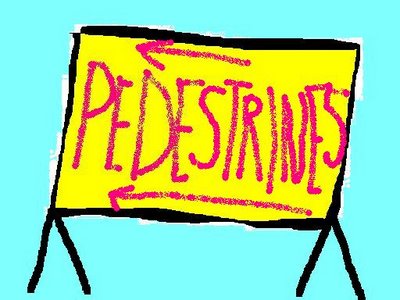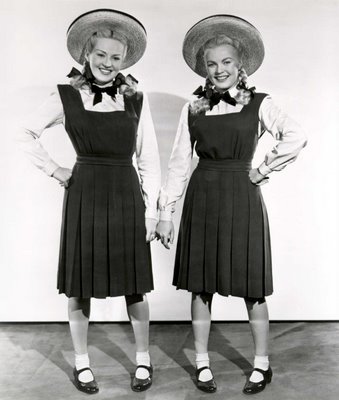The first time I changed the picture on my profile, it wasn’t necessarily a conscious statement about any evolution in my identity, but more a case that I wanted to post another wonderful drawing by Adrian Tomine, one that more adequately captured my state of being at the time. So I made the change from the
paranoid girl at the bus stop, to the picture of the
sleeping girl, which is how I spent much of my time when I was intermittently employed. I still think that both of these pictures illustrate an aspect of me, but now there is yet another Tomine picture that is more appropriate to my recent postgraduate activity. This new profile picture is one that originally appeared in
The New Yorker, presumably as part of a review or article about the
film Sylvia, a biopic of Sylvia Plath, starring Gwyneth Paltrow. Evidently this is a depiction of Paltrow as Plath during a productive stage of writing. It seems necessary to emphasise that it’s the presence of Paltrow/Plath at the typewriter amidst a well-stocked library that has made me choose this picture, rather than the other possible connotation of depression and suicide that any mention of Plath invokes. It’s all too easy to forget what a bright young woman Plath was; she won a Fulbright Scholarship, which is what first took her to England. But somehow that gets lost amidst the narrative of her as a down-trodden wife and mother driven to suicide by an absent, adulterous husband. Perhaps the popular imagination is still in thrall, not only with the notion of the tortured artist, but also the mad woman. Is it easier to believe these powerful myths which, on the one hand, glorify mental illness and, on the other, limit the ways we can remember a woman who, for the most part, was an intellectual and creative force to be reckoned with?
Lest I seem too eager to distance myself from the spectre of depression that accompanies Sylvia Plath, I should say that even without Tomine’s drawing as my avatar, depression haunts me. It’s out of my own experience with depression and its treatment that I got the idea for my PhD thesis topic, which will look at representations of psychotherapy in ‘quality’ television drama. Before I came up with this idea, I had questioned whether I was suited for an academic career. Certainly, during my worst periods, I had been incapable of making a piece of toast to accompany a bowl of tinned soup, never mind work the long hours and produce the publications that are demanded of academics. I suppose as I emerged from depression and began to work constructively on finishing my Master’s, I started to notice the world again, to read and watch the news, which I hadn’t felt able to for several years. I remember a news item about a man who had taken too much Zoloft and then killed his wife. In summation at his trial, the judge had implicated the drug in the defendant’s actions. The judge’s comments seemed to take no account of the fact that the man hadn’t taken the drug as it was prescribed by his doctor or, indeed as the literature accompanying the drug advised. The defendant had been unable to sleep after taking the prescribed dose, and so he had taken more. My sister, who is a nurse, explained to me that the man was older and so was used to an older generation of psychotropic drugs which you did take more of when the initial dose didn’t seem effective. While that explained why the man took more Zoloft than was safe, it didn’t, to my mind, condemn the drug as inherently dangerous, which was the implication of the judge’s statement as it was reported. This case struck me as just one example of the popular ignorance surrounding the use of psychotropic drugs and depression.
My heightened awareness of mental health and its treatment as it was represented in the news media, extended to my viewing of fictional television programmes. I began to notice that so many characters, at some point or another, ended up in therapy. When Sydney from
Alias returned home after being missing for two years, presumed dead, the CIA, her employer, sent her off to group and individual therapy sessions, as part of standard procedure for agents who’d had similar experiences (Of course, CIA agents go missing and mysteriously reappear in this way, all the time). When Nick Fallin from
The Guardian threw his mobile phone across a court room in an apparently inappropriate expression of anger, he was ordered by the judge to enter into a series of therapy sessions. He said nothing the entire time he went to those sessions, except to say that he wasn’t going to talk. Then there’s the whole Law & Order franchise and other crime/police dramas like
Halifax f. p.,
Cracker and
Wire In The Blood, where psychiatric assessments are instrumental in profiling criminals and their behaviour. I could keep going; I haven’t even mentioned
The Sopranos and
Six Feet Under. And then there’s that wonderful moment in the first season of
Desperate Housewives, where Bree offers the psychiatrist she and Rex are seeing her appraisal of Freud: ‘Think of all the things his mother sacrificed so that he might gain an education and achieve greatness, and what does he do? He comes up with a theory that blames her for everything!’ Or words to that effect.
I’m not interested in whether or not the programmes I eventually write about show positive or negative representations of psychotherapists and the psychotherapeutic process; it’s more about the uses to which the characters are put within the narratives that might offer an insight into contemporary social/cultural/political identity. I am intrigued that David Chase, the creator of
The Sopranos, has said that he was helped by psychotherapy. Dr Jennifer Melfi was born out of that experience, and while she is generally perceived to be a ‘realistic’ representation of the profession,
The Sopranos isn’t simply an apology for psychotherapeutic practices either. This is the point at which my intellectual interest sparks. I have read some scholarly texts that critique therapeutic discourse and its attendant practices implicating it in the perpetuation of a kind of false-consciousness. There is no doubt that therapeutic discourse is a pervasive one, but there is something in the tone of what I have read that renders it a totalising one. Perhaps it is necessary to overstate the case in order to make the first arguments. I am intrigued that David Chase writes about the psychotherapeutic process, with full knowledge of what is useful about it, while still, I think, retaining a critical position in relation to it as a powerful form of knowledge and mode of governance.
In the news this week, another report, this time about scientists who have isolated the ‘blue’ gene (that pun could only be intended). Apparently they were surprised to discover that while more women have depression, sex is not a factor which determines whether one has the gene or not. The scientists stressed the role of ‘nurture’ or environment in the development of the condition. I am certain (hope?) the research contains details and nuances that were not reported, surely scientists could not just be concluding that environmental factors are paramount in the development and, importantly, the diagnosis of depression? Isn’t this something that feminist scholars and writers have been saying for years, without the benefit of knowing about genetics? Think of Charlotte Perkins Gilman’s
The Yellow Wallpaper or Jean Rhys’s
Wide Sargasso Sea? There seems to be something very hopeful about scientists who wish to find purely biological reasons to solve a whole host of social injustices. Still, think of how medical discoveries had they come sooner, would have helped T.S Eliot’s first wife and perhaps even Plath.
If there is one image from
Sylvia that consumes me, it’s that of Plath/Paltrow standing in a public telephone box calling everyone she could think of to come and help her, to no avail. In the sequence of the film, it is not long after this scene that Plath plans and commits suicide. It is this sense of Plath as isolated and abandoned, solely responsible for the care of her small children, for which we are perhaps most unforgiving of Ted Hughes. It is such a tough issue; being responsible and caring for someone with a debilitating mental illness would be such a lot for one ordinary person, who has a right to their own life and happiness, to bear. We would all like to think, I suppose, that we would do everything for the unwell person in our lives, and conversely that we wouldn’t be abandoned by those we most relied upon, even after we had done everything we could to push them away.
Last week I read a book that I discovered while browsing the shelves at Borders.
98 Reasons for Being by Clare Dudman is about the historical figure, Dr Heinrich Hoffman, a physician at a mental institution in Frankfurt during the 1850s. He was also an author of fiction, including the illustrated book of children’s tales,
Struwwelpeter . The 98 reasons for being of the title are Hoffman’s patients, the inmates at the asylum, whom he worries over, trying to cure using the latest medical thinking to alleviate their suffering. I was effected by this book in a way I hadn’t anticipated when I first began to read it. While I was intrigued by the topic of the beginning of modern psychiatry, I was initially put off by the voice of one of the patients, which is italicised throughout, and begins rather incoherently. I wasn’t sure if I could be drawn into the world of the novel if I had to decipher the disjointed sentences of Hannah’s thoughts. Hannah’s voice becomes clearer as her connection to the world is restored, so I soon became pulled into her story. The other characters who populate the asylum have been on my mind as well since I finished reading the book. The reader is privy to Hoffman’s doubts about his treatment of his patients through his conversations with Hannah and his inner thoughts. He is convinced that there are always physical causes for mental illness and disagrees with the ‘alienists’ (psychiatrists) about the value of talking. He reluctantly resorts to talking to Hannah, who does not talk, after he has tried a whole range of what now seem barbaric treatments, that seem to involve a lot of water. Hoffman worries that he is causing more harm than good, especially when he reflects that some people think mental illness doesn’t exist. There is one patient, Josef, who prefers to be called Josephine Champagne and wears his hair in long ringlets. His family has committed him and he is deprived of all the beautiful things he loves. I kept picturing the bearded lady from
Little Britain while I was reading. The joy that Josef expresses when he is able to dress up in beautiful things reminded me of the demeanour of the bearded lady. Some of the illnesses that are portrayed in
98 Reasons are recognisable, such as the compulsion to check everything which afflicts Grete. She is compelled to check her feet and hands and any implements she is holding before making any kind of move. She also has anorexia. Other illnesses are obscure, to me at least. There is one woman who has an encroaching paralysis. Perhaps this is cerebral palsy or muscular dystrophy? And epileptics were housed in mental asylums as well. One passage, written to reflect a report that summarises the thinking of the day on epilepsy, reads:
[A]ttacks may be prevented by applying a tourniquet to an arm, amputating a toe... It has also been found to be of some benefit to amputate small tumours, to fire a gun near by, to violently pull back an arm or head. It is important always to ensure the evacuation of worms or foreign bodies lodged in the stomach. Patients may also, of course, be bled and purged of mucus...
We have not found the following to be of any palliative value at all: earthworms, the dried afterbirth of a first-born, ground-up human skull, or dried brain thereof, backbone of a lizard stripped of its flesh by ants, the heart and liver of a mole or a frog...
The reader is also offered insight into the lives of the attendants at the asylum, some of whom are capable of terrible cruelties and others who are just poor and desperate.
98 Reasons for Being is a ‘weirdly evocative novel’ and ‘memorably poignant’, which is how one of the review blurbs on the cover describes it. On the one hand it made me reflect that I am extremely grateful that I had depression in this day and age rather than at any other time in history and, as with my thoughts about
The Sopranos, I think it offers a portrait of psychiatry as much more than a profession inhabited by crude caricatures who molest their patients or simply seek to control the unconventional with little reflection on their practices. It’s a book that contemplates the mistakes and prejudices of early mental health practices but allows for the modest successes that physicians like Hoffman also effected.









